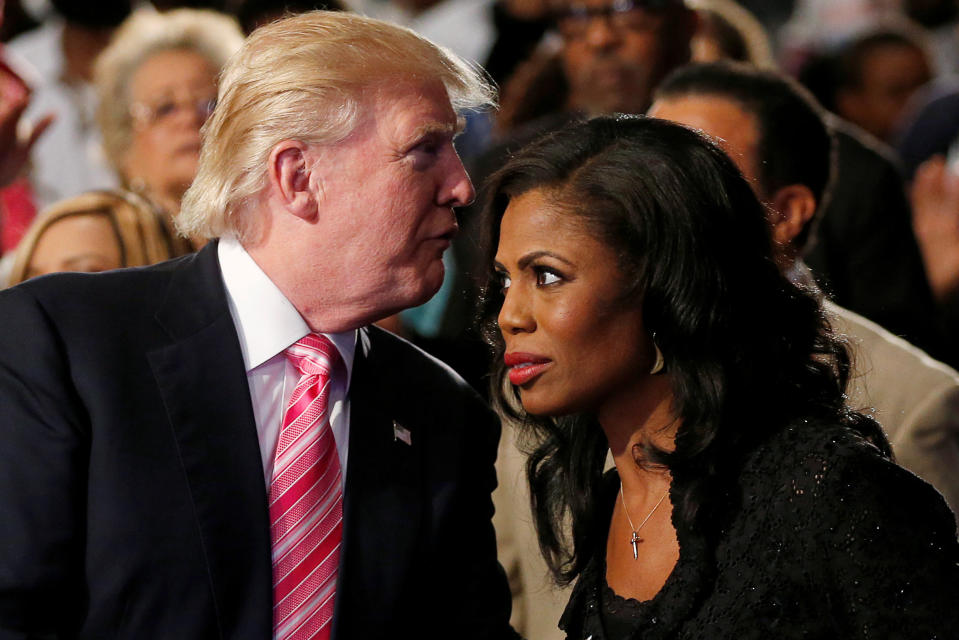Judge says Trump campaign screwed up on wording of confidentiality agreements
A Manhattan judge issued a ruling on Thursday that thwarted the Trump campaign’s attempts to keep a lawsuit out of open court, with potential implications for the looming battle over fired Trump aide Omarosa Manigault Newman’s slow-motion revelations of her experiences in the Trump campaign and White House.
The decision came in a lawsuit filed by Jessica Denson, a former campaign staffer who filed a complaint last November that alleged she was subjected to “harassment and sexual discrimination” while she worked on Trump’s White House bid in 2016. Lawyers for the Trump campaign tried to force the case into private arbitration based on an agreement signed by staffers that included nondisclosure and nondisparagement provisions. In her decision, Judge Arlene Bluth of New York State Supreme Court disclosed flaws in the wording of the agreement that she said limited its scope.
The ruling exposes potential weaknesses in the non-disparagement and non-disclosure agreements that staff at Trump’s White House, his campaign, and the Trump Organization have been made to sign. These documents have made headlines this past week as Manigault Newman, a former White House staffer, claimed the White House was trying to use them to “silence” her after she went public with a tell-all book and a series of embarrassing tapes from her time in the West Wing and from working on Trump’s campaign.

Denson is suing the Trump campaign in state court for $25 million, alleging she was subjected to “severe and pervasive slander, aggravated harassment, attempted theft, cyberbullying, and sexual discrimination and harassment” by her former supervisor, Camilo Sandoval, and other campaign staffers after she received a promotion to “mobilize the campaign’s Hispanic engagement effort” in September 2016. The Trump campaign and Sandoval, who is currently the acting chief information officer of the Department of Veterans Affairs, did not respond to requests for comment on this story. According to Denson’s complaint, which was filed in November 2017, the harassment included being “routinely overworked,” the mysterious disappearance of her laptop charger, being treated in a “demeaning and abusive matter,” and being subjected to a conversation with Sandoval where he “laid down on a couch in front of her” in a “physical, sexual posture.”
Trump campaign attorneys responded a month later by filing a request for arbitration with the American Arbitration Association, and demanding damages of $1.5 million because Denson “publish[ed] certain confidential information and disparaging statements in connection with a lawsuit she filed against claimant in New York Supreme Court.” On March 19, lawyers for the campaign from the firm of Larocca Hornik Rosen Greenberg & Blaha moved to take the case out of court and have it heard in private arbitration. In the motion, the Trump campaign lawyers argued Denson was bound to private arbitration because, before joining the president’s White House bid, she signed “a written employment agreement in which she expressly agreed to arbitrate ‘any dispute arising under or relating to’ her employment.”
Arbitration is an alternative to trial, a hearing before arbitrators (often retired judges) in which the records may be sealed from the public. The parties involved also have some ability to decide who will hear the case, unlike the random assignment process typical of the courts.
The motion from the Trump campaign attorneys included a copy of the agreement Denson signed, which was similar to documents that have reportedly been signed by White House staffers.

Bluth’s ruling noted flaws in the agreement Denson was required to sign. The judge suggested the document was worded badly, and implied it could have done what the campaign’s attorneys wanted if it had been written better.
“As an initial matter, the Court observes that the arbitration clause confines arbitration to ‘any dispute arising under or relating to this agreement,’” Bluth wrote, adding with emphasis, “It does not require arbitration for any ‘dispute between the parties’ or even ‘any dispute arising out of plaintiff’s employment.’”
Bluth even took aim at the title of the document prepared by the Trump campaign. In the motion to compel arbitration, the campaign’s attorneys described the document signed by Denson as an “employment agreement.” The judge noted this wasn’t actually written down.
“The agreement is simply titled ‘Agreement’ — not ‘Employment Agreement,’” Bluth wrote.
The judge also found that the agreement only covers “a specific list of five prohibited acts” rather than all aspects of Denson’s employment. The document provided for “no disclosure of confidential information, no disparagement, no competitive services, no competitive solicitation, and no competitive intellectual property claims.”
“There is simply no way to construe this arbitration clause in this agreement to prevent … pursuing harassment claims in court. The arbitration clause could have been written to require any disputes arising out of … employment to go to arbitration. … But it did not,” wrote Bluth.
Bluth’s ruling became public today when Denson tweeted a copy of the order. It is notable because Denson is representing herself and still defeated the Trump campaign’s lawyers. The judge’s decision represents a rare victory for a pro se litigant, the legal term for a person proceeding in court on their own behalf against a party represented by licensed attorneys. Denson, a young actress, declined to comment on this story.
In an ironic twist, President Trump was personally a party to the New York case that establishes the legal principle controlling Bluth’s decision. That 1993 case, Trump v. Refco Properties, Inc., concerned a dispute among the partners who own the Grand Hyatt near Grand Central Terminal in Manhattan; it established that a party may not be forced into arbitration unless their agreement to arbitrate “expressly and unequivocally encompasses the subject matter of the particular dispute.” President Trump sought to avoid private arbitration in that case, and won the issue on appeal. Bluth specifically cited that decision in her ruling against Trump’s campaign.
The dispute between Denson and the Trump campaign now spans several different public and private forums. In addition to the action Denson brought in 2017 in New York State Supreme Court, she filed a complaint in federal court seeking to have the entire nondisclosure agreement declared null and unenforceable. The Trump campaign’s attorneys may stand a better chance of prevailing in the motion to compel arbitration filed in conjunction with the federal court case, because Denson’s complaint is more likely to be viewed as “arising under or relating to” the agreement than Denson’s harassment claims in state court.
These questions may bear, if indirectly, on the attempt by Trump’s lawyers to silence Omarosa Manigault Newman. That issue has mostly been discussed as a First Amendment matter, in which a citizen’s right to criticize the president is at stake. But Denson’s dispute hasn’t reached the level of Constitutional rights, at least not yet. It is being litigated, so far, on the wording of the forms crafted by Trump’s lawyers.
Bluth, who also ruled to allow Denson to amend her complaint, repeatedly described her decision as being “put simply.”
“It is clear that the limited agreement is not applicable to the current dispute,” the judge wrote.
_____
Luppe B. Luppen is a lawyer and a writer in New York City. Born and raised in Los Angeles, he graduated from Stanford University (2005) and Washington & Lee School of Law (2008). He is @nycsouthpaw on twitter.
_____
Read more from Yahoo News:

